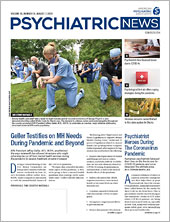The coronavirus pandemic engulfed New York City’s health care system for a number of months. The downstream effects not only became evident across hospitals that found it necessary to redeploy several physicians to critical care units but also in outpatient services that functioned in a very limited capacity to meet patient needs. Addiction services were also significantly impacted, and opioid treatment programs (OTPs) were confronted with complex challenges that included requiring patients to present daily to receive maintenance doses of methadone. Inpatient rehab units were closed, and the process of converting them to COVID units seemed to lack planning and strategy, leaving many patients in the lurch for services.
Patients struggling with opioid use disorders are already at risk for respiratory depression, and some are confined and sometimes find themselves in prisons or homeless shelters. Because they are in close contact with others, sthey are especially vulnerable to COVID-19. To prevent people in need from being denied essential services, the Substance Abuse and Mental Health Services Administration announced blanket exceptions in late March for maintenance patients to receive upward of 14 to 28 daily take-home doses, depending on each patient’s stability in treatment. Clinically stable patients can be dispensed 28-day medication supplies.
Several accommodations are in effect to initiate patients on buprenorphine via telepsychiatry, waiving the requirements for initial physical examinations. Patients on methadone, however, must still have in-person evaluations.
Clearly, not all challenges are being circumvented. With emergency departments overflowing and primary care clinics slowly opening up, not only has it become practically impossible to get medical clearance for patients requesting detox, but psychiatrists also find themselves dealing with many such requests. Queues at methadone clinics have gotten longer, thereby defeating the purpose of physical distancing. The shutting down of liquor stores in April brought on additional concerns about patients going into life-threatening alcohol withdrawal.
With uncertainties still looming large around COVID-19, the field of addiction psychiatry is at the start of a road fraught with many challenges: underserved patients at risk for overdosing or withdrawing and services overly reliant on technology that is unable to fully substitute one-on-one interactions for this subset of patients. At the crux of it all, we have to make the most of the resources we have, rise to the current occasion, and plan strategically for a future with limited capacity.
The pandemic has shown us the importance of contingency plans in effect to provide addiction services to address the needs of patients. Some of these measures could be expanded to include risk stratification of patients in OTPs, permitting extended durations for medication refills, and developing a workflow for medically clearing patients so that they can be ready for initiation or maintenance of treatment in detox and rehab units that could even be managed virtually. A guideline for disaster management operations could be established by the governing bodies of associations. Preparedness with respect to these facilities may enable a more efficient and safe functioning of addiction facilities in the wake of future crisis situations. ■


